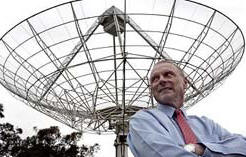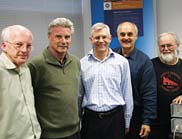|
CSIRO researcher John O’Sullivan has won the Prime Minister’s 2009 Prize for Science. Photo: Sasha Woolley |
CSIRO's Fundamental Research of Over 17 Years Ago Leads to $200 Million and Counting |
The WLAN Project Team (L-R): Mr Graham Daniels, Dr John O'Sullivan, Dr Terry Percival, Mr Diet Ostry, Mr John Deane. |
According to the media release:
The 2009 Prime Minister's Prize for
Science has been awarded to Dr John O'Sullivan.
The award and $300,000 grant
recognises Dr O'Sullivan's contributions to astronomy and to the
invention which made wireless computing practical.
While looking for exploding black holes Dr O'Sullivan created a
technology that cleaned up intergalactic radio waves.
Then in 1992, he and his colleagues at CSIRO realised that the same
technology was the key to fast reliable wireless networking in the
office and home.
Their patented invention is now built into international standards and
into computers, printers, smart phones and other devices used by
hundreds of millions of people every day.
It's one of the most significant achievements in CSIRO's 83 year history
and illustrates how blue sky research can have very practical outcomes.
As Dr O'Sullivan tells it: "I was inspired to think about ways of cleaning up smeared radio signals to make searching for short pulses like those from exploding black holes easier. We ended up building a 'fast Fourier transform' chip to do these sorts of processing tasks efficiently and fast. That proved to be the key to untangling the web of wireless signals so we could build a workable high speed wireless local area network (WLAN)."
CSIRO’s Chief Executive, Dr Megan Clark, said “Dr O’Sullivan has made many extraordinary contributions to Australian and international science across the fields of radioastronomy and wireless technology. He was instrumental in the design of the Australia Telescope and pioneered the approach that led a CSIRO team to solving the multipath problem that was crucial to the development of fast wireless networks."
So, in the current climate of increasing need for the justification of research and the pressure to produce results in the short term -- and that includes fundamental research -- would Dr O'Sullivan have the latitude, and especially within the confines of CSIRO, to do the equivalent of developing an FFT chip with the purpose to clean up radio signals from the black holes spawned by our universe? The "Ah Ha" moment of adapting the technology for coping with multipathed radio transmissions and the usefulness for high-speed WLAN was an afterthought which over seventeen years later, and a decade long legal dogfight, has yielded a $200 million dividend. We're not privy to the overall net profit from the exercise.
Keep in mind that a foremost justification by the Minister for Innovation, Industry, Science and Research, Senator Kim Carr, for seeking the Square Kilometre Array for Australia is the fillip to Australian industry. Certainly not a bad thing to mention, but perhaps emphasising the potential advancement in understanding the formation of our universe should have been considered of primary consequence.
Were she alive today, it's not improbable that Australia's and CSIRO's Ruby Payne-Scott, "one of the first people in the world to consider the possibility of radio astronomy", would have made her views known and without equivocation.

